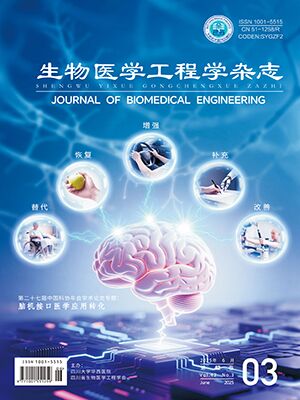| 1. |
陈淑玲. 《儿心量表2016版》在孤独症谱系障碍中的应用研究. 武汉: 华中科技大学, 2020.
|
| 2. |
毕雪. 了解“来自星星的孩子”. 吉林日报, 2023-04-11(005).
|
| 3. |
周正荣, 王晨光, 王谦倩, 等. 经颅直流电刺激改善孤独症谱系障碍儿童社交认知: 基于图片命名的脑电图研究. 中国康复医学杂志, 2021, 36(1): 38-45.
|
| 4. |
Genovese A, Butler M G. Clinical assessment, genetics, and treatment approaches in autism spectrum disorder (ASD). Int J Mol Sci, 2020, 21(13): 4726.
|
| 5. |
张勇. 音乐治疗学. 武汉: 湖北科学技术出版社, 2010: 11-12.
|
| 6. |
Masataka N. Neurodiversity, giftedness, and aesthetic perceptual judgment of music in children with autism. Front Psychol, 2017, 8: 1595.
|
| 7. |
Simpson K, Keen D. Music interventions for children with autism: narrative review of the literature. J Autism Dev Disord, 2011, 41(11): 1507-1514.
|
| 8. |
Buday E M. The erects of signed and spoken words taught with music on sign and speech imitation by children with autism. J Music Ther, 1995, 32(3): 189-202.
|
| 9. |
樊越波, 彭晓玲, 黄丹. 脑电图在孤独症谱系障碍中的应用. 中国康复, 2017, 32(5): 379-382.
|
| 10. |
Banerjee A, Sanyal S, Patranabis A, et al. Study on brain dynamics by Non Linear Analysis of music induced EEG signals. Physica A, 2016, 444: 110-120.
|
| 11. |
Sheikhani A, Behnam H, Mohammadi M R, et al. detection of abnormalities for diagnosing of children with autism disorders using of Quantitative Electroencephalography Analysis. J Med Syst, 2012, 36(2): 957-963.
|
| 12. |
Neuhaus E, Santhosh M, Kresse A, et al. Frontal EEG alpha asymmetry in youth with autism: Sex differences and social-emotional correlates. Autism Res, 2023, 16(12): 2364-2377.
|
| 13. |
Zhao Q, Luo Y, Mei X J, et al. Resting-state EEG patterns of preschool-aged boys with autism spectrum disorder: A pilot study. Appl Neuropsychol Child, 2024, 13(4): 413-420.
|
| 14. |
Afifi L, Raafat H, Abdullah K, et al. Quantitative EEG in autistic children. Egypt J Neurol Psych, 2015, 52(3): 176.
|
| 15. |
雷敏, 孟光, 张文明, 等. 基于虚拟开车环境的自闭症儿童脑电样本熵. 物理学报, 2016, 65(10): 334-345.
|
| 16. |
Bakheet D, Maharatna K. Linear and nonlinear analysis of intrinsic mode function after facial stimuli presentation in children with autism spectrum disorder. Comput Biol Med, 2021, 133: 104376.
|
| 17. |
Kang J N, Chen H M, Li X, et al. EEG entropy analysis in autistic children. J Clin Neurosci, 2019, 62: 199-206.
|
| 18. |
Li F L, Zhang S, Jiang L, et al. Recognition of autism spectrum disorder in children based on electroencephalogram network topology. Cogn Neurodynamics, 2024, 18(3): 1033-1045.
|
| 19. |
Kang J N, Jin Y J, Liang G H, et al. Accurate assessment of low-function autistic children based on EEG feature fusion. J Clin Neurosc, 2021, 90: 351-358.
|
| 20. |
Ke X H, Song W, Yang M G, et al. Effectiveness of music therapy in children with autism spectrum disorder: A systematic review and meta-analysis. Front Psychiatry, 2022, 13: 905113.
|
| 21. |
张梦怡. 古筝特殊音乐教育在自闭症领域的研究与应用——以儿歌弹唱教学为例. 人民音乐, 2019(9): 64-67.
|
| 22. |
Deng L, He W Z, Zhang Q L, et al. Caregiver-child interaction as an effective tool for identifying autism spectrum disorder: Evidence from EEG analysis. Child Adolesc Psychiatry Ment Health, 2023, 17(1): 138.
|
| 23. |
闻芳, 庞姣, 李小俚, 等. 经颅直流电刺激对孤独症谱系障碍儿童脑电的影响研究. 中国生物医学工程学报, 2019, 38(5): 566-572.
|
| 24. |
安占周. 孤独症脑功能状态分析及脑调控效果研究. 秦皇岛: 燕山大学, 2020.
|
| 25. |
Wang J, Barstein J, Ethridge L E, et al. Resting state EEG abnormalities in Autism Spectrum Disorders. J Neurodev Disord, 2013, 5(1): 24.
|
| 26. |
Song Y D, Zhang J X. Discriminating preictal and interictal brain states in intracranial EEG by sample entropy and extreme learning machine. J Neurosci Methods, 2016, 257: 45-54.
|
| 27. |
Pincus S M. Approximate entropy as a measure of system complexity. Proc Natl Acad Sci U S A, 1991, 88(6): 2297-2301.
|




